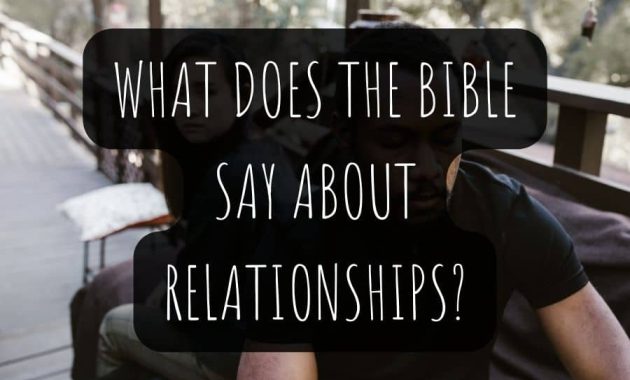What Does the Bible Say About Relationships?
At the heart of human existence is the need for relationships. Relationships can be complex, but they are an essential part of life.
We might ask ourselves, "What makes a good relationship?" or "How can I build strong connections with others?" Fortunately, as Christians, we have a source of wisdom and guidance in relationships which is the word of God (The Bible).
See also: Bible Verses About Sexual Immorality
In this article, we will explore the question, "What Does the Bible Say About Relationships?" and examine some of the key teachings and principles that it offers.
Whether you are seeking to improve your relationship with God or with others, the wisdom found in the Bible can be a valuable resource.
What Is A Christian Relationship?

A Christian relationship is between individuals who share a common faith in Jesus Christ as their Lord and Savior. In such a relationship, the foundation is built on biblical principles and a desire to honor God in every aspect of the relationship.
At the center of this relationship is the love of God (also known as agape love), which is demonstrated through the individuals' love for each other. This love is characterized by selflessness, forgiveness, and a commitment to serve one another.
Types of Relationships in the Bible
The Bible mentions several types of relationships, each with unique characteristics and dynamics.
- Marriage - Marriage is one of the most significant relationships mentioned in the Bible. It is a covenant relationship between a man and a woman that reflects the relationship between Christ and the Church. The Bible offers guidance on how to build a strong, healthy marriage.
- Family - The Bible emphasizes the importance of honoring parents and caring for family members. The Bible offers examples of healthy and dysfunctional family relationships, which we can learn from to help strengthen our relationships.
- Friendship - Friendship is a valuable and meaningful relationship that is mentioned throughout the Bible. The Bible teaches us about the characteristics of true friendship, such as loyalty, trust, and support. It also warns us about the dangers of negative influences and toxic friendships.
- Community - The early church is a great example of a strong and supportive community where believers could unite in worship, learn, and encourage one another.
Principles Of Relationship Building
Building and maintaining healthy relationships can be a challenging task. Fortunately, the Bible provides key principles for building strong and healthy relationships with others.
- Love - Love is the foundation of healthy relationships. The Bible teaches us that love is patient, kind, forgiving, and selfless. It also reminds us that God is love and that we are called to love others as God loves us.
- Communication - Communication is essential in any relationship. The Bible teaches us about the power of words and encourages us to use our words to build up others and avoid gossip or harmful speech. It also teaches us to listen well and seek to understand the perspectives of others.
- Forgiveness - Forgiveness is a crucial aspect of healthy relationships. The Bible teaches us the importance of forgiveness and encourages us to forgive others as God has forgiven us.
- Respect - Respect is a vital ingredient in healthy relationships. The Bible teaches us to value and honor others regardless of their background, status, or beliefs. It also reminds us to respect boundaries and avoid actions or behaviors that might harm others.
- Trust - Trust is another important component of a healthy relationship. The Bible teaches us the importance of trust and encourages us to be trustworthy and honest in our relationships.
Navigating Challenges In A Complicated Relationship
While healthy relationships can bring joy and fulfilment to our lives, challenging relationships can be a significant source of stress and pain. The Bible offers guidance on how to navigate through difficult relationships and offers hope for healing and restoration.
- Conflict Resolution - Conflict is inevitable in relationships, but the Bible teaches us about healthy conflict resolution. It encourages us to seek reconciliation with others and to approach conflict with humility, patience, and respect. It also reminds us to avoid revenge or retaliation and to trust God to bring justice and healing.
- Boundaries - Setting healthy boundaries is essential in challenging relationships. The Bible teaches us about the importance of boundaries and encourages us to take responsibility for our own emotions and behaviors. It also reminds us to respect the boundaries of others and avoid manipulating or controlling them.
- Forgiveness - Forgiveness is just as crucial in challenging relationships as healthy ones. The Bible teaches us that forgiveness can heal and restore broken relationships.
- Wisdom - The Bible teaches us to seek God for wisdom to make a wise decisions when faced with a challenging relationship. It also reminds us to seek counsel from wise and trustworthy people and to avoid making decisions based on fear or anger.
What Does the Bible Say About Relationships?

- Ecclesiastes 4:9-10 - "Two are better than one because they have a good return for their labor: If either of them falls down, one can help the other up."
- 1 Corinthians 15:33 - "Do not be misled: 'Bad company corrupts good character.'"
- Mark 10:9 - "Therefore what God has joined together, let no one separate."
- 1 Corinthians 13:4-5 - "Love is patient, love is kind. It does not envy, it does not boast, it is not proud. It does not dishonor others, it is not self-seeking, it is not easily angered, it keeps no record of wrongs."
- Proverbs 17:17 - "A friend loves at all times, and a brother is born for a time of adversity."
- 1 Peter 4:8 - "Above all, love each other deeply, because love covers over a multitude of sins."
- Romans 12:10 - "Be devoted to one another in love. Honor one another above yourselves."
- Proverbs 16:32 - "Better a patient person than a warrior, one with self-control than one who takes a city."
- Galatians 6:9 - "Let us not become weary in doing good, for at the proper time we will reap a harvest if we do not give up."
- 1 Thessalonians 5:11 - "Therefore encourage one another and build each other up, just as in fact you are doing."
FAQs About Relationships from a Biblical Perspective
What does the Bible say about finding a spouse?
The Bible does not provide a specific formula for finding a spouse but gives us principles to guide us in our search. It encourages us to seek a partner who shares our faith and values, to prioritize character over external qualities, and to seek His face in prayer so we don't end up with the wrong partner.
What does the Bible say about premarital sex?
The Bible teaches that sex is a gift from God to be enjoyed within marriage. It discourages premarital sex and reminds us that sexual immorality can have significant consequences. The Bible also encourages us to honor our bodies as temples of the Holy Spirit and to seek purity in our relationships.
What does the Bible say about forgiveness in relationships?
The Bible emphasizes the importance of forgiveness in relationships and encourages us to forgive others as God has forgiven us. We are reminded that forgiveness does not mean excusing hurtful behavior but rather releasing the offender from our anger and bitterness.
What does the Bible say about boundaries in relationships?
The Bible teaches us about the importance of healthy boundaries in relationships, as this leads to true love rooted in respect, honor, and mutual support. Setting healthy boundaries is important to protect ourselves and those we love from harm and to create an environment where trust can flourish (Proverbs 25:17).
What does the Bible say about ex relationships?
The Bible does not use the term "ex-relationships" specifically, as it is a modern term used to describe relationships that have ended. However, the Bible does speak about broken relationships.
1 Corinthians 7:15 says, "But if the unbelieving partner separates, let it be so. In such cases, the brother or sister is not enslaved. God has called you to peace."
Paul is clear here that if a believer is in a relationship with an unbeliever and the unbeliever chooses to leave, the believer is not bound to stay in the relationship.
So the lesson here is we should avoid putting ourselves in such relationships in the first place so we don't end up in a broken relationship.


Related Posts